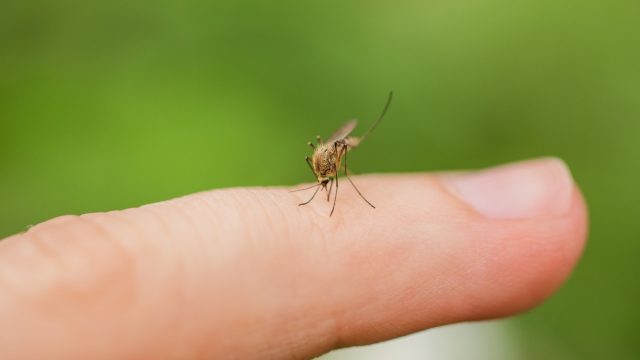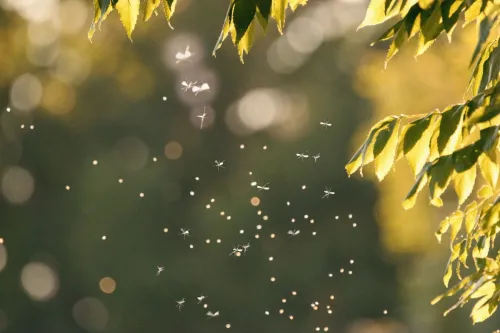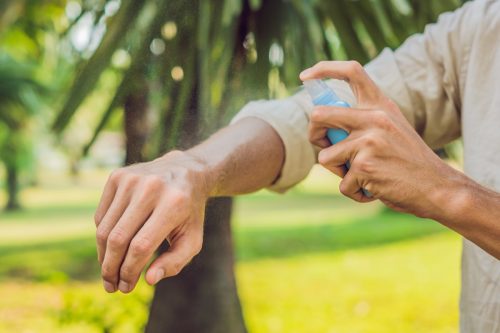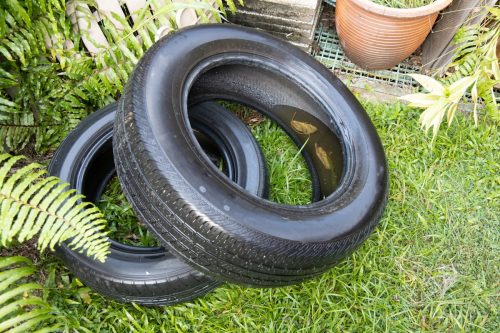Virus-Carrying Mosquitoes Are Spreading in the U.S.—Experts Say Take These Precautions

Summer offers a great opportunity to get outside and enjoy the sunshine, but at the same time, it also means that mosquito season is upon us. While these aggravating little insects typically just leave you with an itchy bug bite, some can also infect you with a serious disease. Now, officials warn that these virus-carrying mosquitoes are spreading across the U.S., potentially increasing your risk of infection. Read on for key precautions experts say you should take to keep yourself safe.
READ THIS NEXT: 5 Plants That Will Keep Mosquitoes Out of Your Yard, According to Pest Experts.
Mosquitoes in Michigan tested positive for Jamestown Canyon virus.

Officials just confirmed the first mosquito-borne virus in Michigan, as samples collected by the Michigan Department of Health and Human Services (MDHHS) tested positive for Jamestown Canyon virus (JCV), according to a June 12 press release.
JCV spreads to humans via bites from infected mosquitoes, with most cases occurring from late spring through mid-fall, the press release states. Cases have been increasing in the Midwest, although JCV is found throughout the country.
Symptoms of JCV generally appear within a few days to two weeks after being bitten, and while most people don’t get sick, those who do may experience fever, headache, and fatigue, the MDHHS press release states. In more serious cases—which are rare—JCV can cause brain or spinal cord disease, including encephalitis and meningitis.
West Nile Virus was also detected in two states.

In Texas, officials reported that mosquito samples tested positive for West Nile Virus (WNV) this year. According to a press release from the Williamson County and Cities Health District (WCCHD), the positive test came from lab results at the Texas Department of State Health Services Lab in Austin. The virus was also recently detected in Clinton County, Indiana, according to the state’s department of health.
Symptoms of WNV include fever, swollen lymph nodes, headache, and body aches, according to the WCCHD press release. Those who become infected can also develop a skin rash on the trunk of the body—which includes the chest, abdomen, pelvis, and back.
Adults over 50 and those who are immunocompromised are at the greatest risk for severe symptoms. These include stiffness, disorientation, coma, tremors, vision loss, and paralysis. In rare cases, death can also occur, the release states.
RELATED: For more up-to-date information, sign up for our daily newsletter.
Don’t skip the bug spray this summer.

To protect yourself from WNV and JCV, as well as eastern equine encephalitis (EEE), officials offer a few recommendations.
“It only takes one bite from an infected mosquito to cause a severe illness,” Natasha Bagdasarian, MD, MPH, FIDSA, chief medical executive for MDHHS, said in the Michigan press release. “We urge Michiganders to take precautions, such as using an EPA-registered insect repellent when outdoors, avoiding areas where mosquitoes are present if possible and wearing clothing to cover arms and legs to prevent bites.”
Not all bug sprays are considered equal, either. In addition to being EPA-registered, as Bagdasarian points out, insect repellent should also contain DEET as an active ingredient, per the MDHHS. The Indiana Department of Health (IDOH) also recommends limiting time outside when mosquitoes are most active, namely during the evening, from dusk to dawn, and in the early morning.
Lastly, while it may seem counterintuitive, you also need to protect yourself from mosquitoes when you’re inside. According to officials, screens on windows and doors are essential to prevent mosquitoes from getting into your home.
Do your part to reduce the mosquito population.

Aside from just protecting yourself, you can also take steps to “reduce the number of mosquitoes where people live, work, and play,” the WCCHD said in its release.
Mosquitoes only need a teaspoon of water to breed, which is why officials urge you to keep tabs and drain any standing water in flowerpots, pet dishes, old tires, or clogged gutters. This also applies to kiddie pools you may leave outside in the summer.
The IDOH says you can go a bit further to minimize breeding grounds by repairing any failed septic systems, drilling holes in the bottom of recycling bins (if left outside), keeping your grass and shrubs cut short, and cleaning out clogged gutters.
“By draining all sources of standing water in and around your property, you reduce the number of places mosquitoes can lay their eggs and breed,” the WCCHD said.